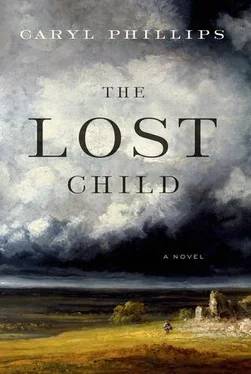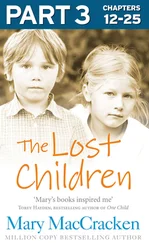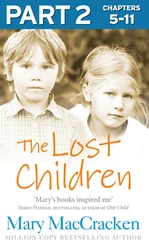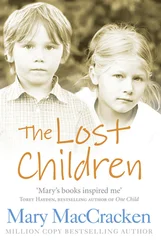The man is not like most people, for he has a matter-of-fact casualness about him, and it looks like nothing could ever cause him to fret. When he laughs, I can see all of his teeth, and I feel as though there’s no bullying gene in him. So I tell him about the time I spent in hospital last summer, and how after the detective came and spoke to me I counted out the pills and took them, and how they decided to take away my eldest and give him to another family until my nerves were better. When my son came to the hospital to visit me, I didn’t know what to say to him, and the poor thing was too shocked to know what to say to me, and so he had no idea what to do with himself. I tell the man this bit of the story, but then I make up my mind to say nothing else, and I just sit with him outside of the pub and we both enjoy the evening sun going down, but I can see him sneaking the odd look and smiling like he’s pleased with me.
He tells me that it’s only three stops on the tube and then it will be my station. When I get out, I should turn right onto the main road. You’ll know it, he says. The station has only the one exit, and it gives out onto a busy, busy road. I’m to walk for ten minutes, then make a left turn at the third traffic light. The house is about a hundred yards down the side street, and he takes a key off a big ring that is attached to his belt, and he writes down a telephone number on the back of a betting slip and passes both the key and the slip to me. Call if you need anything, but it may be a few days before I can get over there to see how you’re doing. But please, you must make yourself at home.
I sit on the tube and it strikes me that if I hadn’t run into this man, I’d probably be on my way to Hyde Park in search of a park bench that I could use as a bed for the night. Instead of this I have a key in one coat pocket, and a pound note in the other one, and I have a place to stay until I get myself up on my feet again. It’s nearly dark by the time I find myself standing outside the three-storey house, which has a huge tree in the front garden, so it’s difficult to see the windows. Even before I put the key in the door, I know that it will be gloomy inside, for how can any light get in? The bare floorboards of the entrance hall are littered with pools coupons and unclaimed letters that nobody has shaped to pick up. It looks like they’ve been kicked to one side, although there’s a small shelf that runs the full length of the wall, and presumably it was put there so people could set things on it. In front of me is a staircase that I imagine leads up to the other flats, but I use the same key and open the door to the right, which leads into what the man called the garden flat.
The bathroom is straight in front of me; I can see a small bathtub and a sink and a toilet all crammed together, but no windows. There’s a cord hanging from the ceiling, but I don’t give it a pull because I’m not ready for any sudden brightness. An open door leads to a small living room with a kitchenette in one corner, a settee that is too big for the cramped space, and a battered wooden chair. I decide that the closed door to the left must be the bedroom. I put down my bag in the tiny hallway and listen, but I can’t hear anything. No voices, no traffic, no noise of any kind, and so I go into the bedroom as I’m tired. However, it’s disgusting and smells like dirty feet, and I know that I won’t be able to sleep in such a room, so I close in the door and pick up the bag and carry it into the living room. I take off my coat and put it over the settee and tell myself that I’ll lie down for a minute, but the next thing I know it’s the morning and I can see light outside.
It occurs to me that I should probably leave this place and find somewhere more suitable, but my whole body feels tired and I can’t even lift up my arm. The last time I felt so jiggered was when the woman came and said I’d be leaving the hospital and I told her that I wasn’t ready. I know, love, she said, but we’re sending you off to Bridlington for a few weeks of convalescing. Nice gardens and fresh air and walks by the sea, it will do you the world of good. I closed my eyes. The woman had already asked me if there was anybody I could spend time with, and I told her that last year my father had written me a letter in which he informed me that my mother’s cancer had come back and she’d died. What cancer? She hadn’t told me anything. She went quickly, was all he said, as if that justified his not getting in touch, so no, there wasn’t anybody I could spend time with. When I opened my eyes, the woman was still talking and reassuring me that I’d probably be able to get my job back at the library, and that I shouldn’t worry, for Ben was being looked after by a lovely family, but it might be a bit of time before I’d have everything back to normal. I looked up at her, and I remember thinking, you bloody well better get my eldest back to me. As the light outside begins to fade, I turn over on the settee and realize that I’ve gone through the whole day in one place. Tomorrow is Sunday, and this is the worst day of the week, for nothing is open. Even here in London most shops are closed, but I can still go and look at the cards in the windows of the newsagents along the main road to see if anybody has any rooms to rent, and then have a quick glance at the “situations vacant” in the window at the Jobcentre. I have to get another job. That’s the way it has to be: first a job, and then I can see about paying for another room.
I’ve not been well, so Sunday also went by without me doing much, but it’s Monday now, and I’m feeling a bit better. I’ve even done a bit of exploring. I discovered that the top-floor flat is empty and two planks of wood have been nailed across the door as though somebody is trying to keep people out, or trying to keep people locked up inside. An old lady lives in the first-floor flat, and she seems to like to keep herself to herself. I met her this morning when I heard the front door open, and I rushed out thinking that my actor friend had finally come to see me, but it was the old lady, and she was coming in, carrying a paper shopping bag from the supermarket. Good morning, she said, in her crisp, well-pressed voice, and then she asked me if I needed anything. I told her that I’d found some crackers in a kitchen cupboard and some jam and margarine in the fridge, so I was alright, thank you very much. She said that it was a shame about the state of the house, but she’d been living in the first-floor flat for over twenty years and she’d watched the place start to fall to pieces. She said she hoped the new owner was going to put some money into the house to bring it back, but so far he hadn’t done anything. I mean, she insisted, the bones of the house are solid; it’s just that the place needs a little helping hand, that’s all. I agreed with her, mainly because I wanted somebody to talk to and she wasn’t judging me. In fact, she was looking at me nicely, and I liked that about her. You know, she said, he might have plans for the place because he’s quite famous. Apparently he’s on the television sometimes. She thought for a moment. You know, he should just invest a little bit of money in our house before it tumbles down all around us, that’s what I think. It could go at any minute.
Last night I couldn’t sleep, so I decided to try and get into the top flat. One of the pieces of wood came loose, but I could tell that it would take some real effort to move the other one. I went back downstairs and poured myself a cup of red wine. In the cupboard under the sink I’d found nearly a dozen bottles of red and white wine and some whisky and vodka, along with three packets of chocolate biscuits and some boxes of white paper napkins that remained tightly sealed in see-through wrapping. This morning I have a headache. I lie on the settee and it occurs to me that I really should go out and set about getting a job, but I can’t help wondering if this is the day that my actor friend is going to come and see me like he said he would. There’s no telephone in the flat, so I can’t call him, and if I go off down the road to try and find a phone box, I might miss him. I reckon I should try and have a bath, but the water comes out brown, and when it eventually starts to run clear, it’s cold like ice, and so I forget that idea and decide that when he comes around, I’ll tell him about the problem with the water. I open the bedroom door to see if it stills stinks in there, and it’s only now that I notice that in the corner there’s a French door to the garden. I stop up my mouth and nose with my hand and pass into the bedroom, and then out through the door, where I discover that everything in the garden is overgrown with weeds and bushes. Next door is lovely, and well maintained, but the garden to this house has been let go, although the brick path suggests that somebody once laid out the place with care. I don’t know the name of the brightly coloured flowers, with orange and yellow petals, that I can see over the broken-down fence, but the truth is I don’t know the names of any flowers besides the ones that everyone knows, like roses and daffodils. But just being outside in a garden lifts my spirits, and suddenly everything seems alright.
Читать дальше












